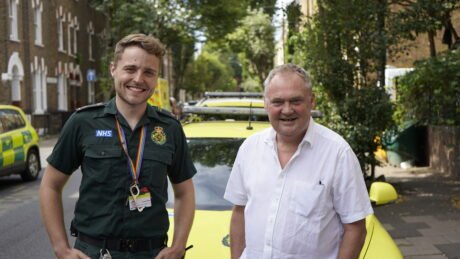
The London Director of NHS England joined a specialist team from the London Ambulance Service (LAS) for a shift on the frontline of physical and mental health care yesterday (Thursday 4 August).
Andrew Ridley joined a senior paramedic and a mental health nurse from LAS who are specially trained to deal with emergency calls from patients in a mental health crisis.
His visit comes as the Service faces increasing numbers of calls relating to mental health – which now account for around 10 percent of all 999 calls.
Andrew said: “I saw first-hand the care and compassion the LAS mental health team offers to vulnerable patients who may need more involved and specifically tailored treatment. Every patient was listened to, supported and assured their physical and mental health needs would be met, without feeling stigmatized.
“The team offers a fantastic service and responds quickly to wherever they are needed. They aim to treat patients in their own home or refer to local services rather than take them to a busy A&E department which can be distressing for a patient in crisis.”
The Service launched its mental health joint response car in November 2018. It proved to be so successful in helping those with mental health issues that in 2020 the team expanded the service from one car working in south east London to six cars operating across the capital.
The expansion of the service has also helped meet the high demand for these specialist mental health teams with LAS answering 109,482 calls between January and July this year for patients in crisis, with the mental health joint response car seeing over 15,100 patients.
Carly Lynch, Consultant Nurse for Mental Health, said: “With a paramedic and mental health nurse responding together, we can treat any physical injuries and ease emotional distress and really personalize the care for each patient and make sure they are referred to the most appropriate services for their needs.”
As well as reducing unnecessary hospital trips, the mental health response teams can free up ambulance crews who might otherwise spend a long time dealing with a complex mental health case.
The Service also has specialist mental health clinicians in its 999 and 111 control rooms, who can assess and refer patients; or give expert advice to our ambulance crews who are treating patients experiencing mental distress.
The mental health team regularly delivers training for frontline clinicians to help them develop greater confidence and understanding when treating and assessing people with an array of mental health concerns.
Daniel Phillips, Mental Health Paramedic Lead, said: “It was a real privilege to have Andy with us for a shift and share the important work of the LAS.
“We saw a variety of patients and were able to demonstrate the importance of parity between mental and physical health care as well as how we interface with key stakeholders.”
For anyone seeking urgent help, the NHS has advice here: Where to get urgent help for mental health – NHS (www.nhs.uk)